AI's making waves in archaeology by transforming how you analyze data and find historical sites. With predictive modeling, you can pinpoint potential digs with up to 80% accuracy, saving time and resources. Advanced technology like remote sensing and drones helps you detect hidden artifacts and structures, while AI algorithms classify and analyze artifacts quickly. Plus, tools like 3D modeling and digital archiving enhance your understanding of cultural heritage. As AI continues to evolve, it promises exciting new prospects for archaeological research. Discover what the future holds and how it might change your view of the past.
Key Takeaways
- AI enhances archaeological analysis by classifying artifacts and predicting potential excavation sites using sophisticated algorithms and predictive modeling techniques.
- Remote sensing technologies, such as drones and LiDAR, allow for the discovery of hidden structures and anomalies without invasive digging.
- Advanced artifact analysis through AI image recognition and 3D modeling provides deeper insights into cultural significance and material composition.
- Ethical frameworks in AI development ensure responsible data management and respect for cultural heritage, addressing potential biases in archaeological interpretations.
- Community engagement initiatives leverage digital platforms to raise awareness and involve local populations in the preservation of cultural heritage.
The Role of AI in Archaeology
AI plays a transformative role in archaeology by enhancing how researchers analyze and interpret vast amounts of data. With advanced technology, you can now classify and interpret artifacts more quickly and accurately. AI algorithms identify materials, age, and cultural significance, streamlining artifact analysis and helping you gain deeper insights into historical data.
This evolution in archaeological practice mirrors the growing demand for AI ethicists in tech, as the integration of technology necessitates ethical considerations in data handling and interpretation.
Moreover, AI's integration of machine learning techniques elevates predictive models, allowing you to pinpoint potential archaeological sites with greater accuracy. This reduces the need for speculative digs, saving time and resources. Utilizing remote sensing and satellite imagery, AI detects anomalies that suggest human activity, making archaeological surveys more efficient.
Digital tools powered by AI, such as 3D modeling and photogrammetry, enable detailed virtual reconstructions of artifacts and sites. This innovation lets you explore and understand these historical treasures without physical handling, preserving their integrity.
The integration of AI in archaeological research fosters interdisciplinary collaboration, combining the expertise of archaeologists, data scientists, and AI specialists. Together, you can drive innovative discoveries, revealing the rich tapestry of human history while pushing the boundaries of what's possible in archaeology.
Predictive Modeling Techniques
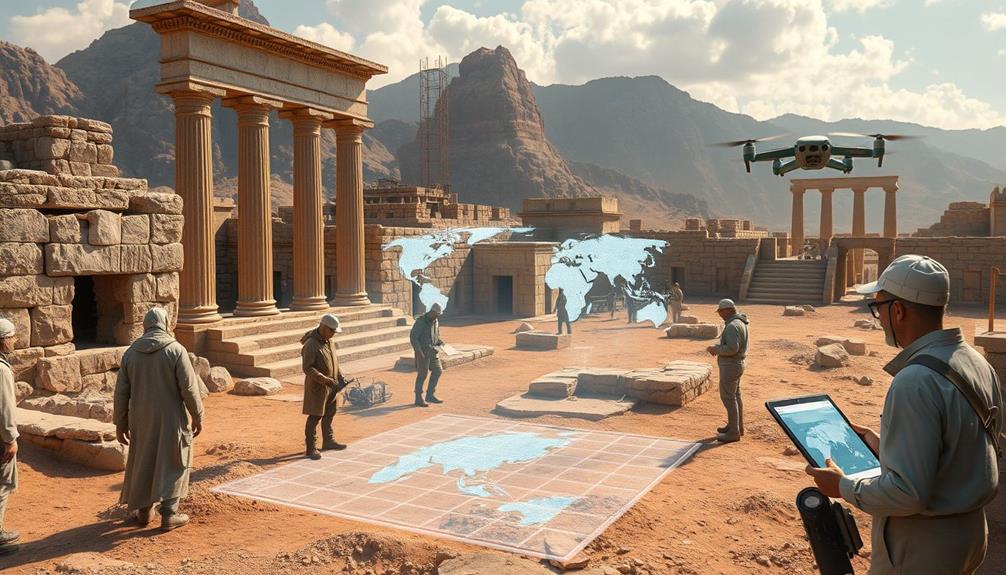
As archaeological practices evolve, predictive modeling techniques have emerged as a powerful tool for researchers. By leveraging AI algorithms, you can analyze extensive datasets that combine historical, geographical, and environmental data to identify potential excavation sites.
Machine learning algorithms excel at detecting patterns, such as proximity to water sources or specific terrain types. This capability generates heat maps that prioritize areas with high potential for significant archaeological findings. Additionally, researchers are focusing on gout management insights that may also apply to understanding ancient health conditions through skeletal analysis.
The integration of satellite imagery, GIS, and climate data further enhances the accuracy of your predictions, allowing you to focus on promising locations while minimizing speculative digs.
A notable Mesopotamian study demonstrated an impressive 80% accuracy rate in predicting new areas of archaeological interest through advanced predictive analytics.
Site Discovery Innovations

Through innovative technologies, archaeologists are revolutionizing site discovery in ways that were once unimaginable. AI in archaeology is playing an essential role, utilizing tools like drones and remote sensing to enhance the detection of anomalies in archaeological landscapes. With high-resolution imaging and data analysis, you can uncover signs of human activity that might otherwise remain hidden.
In addition, the integration of AI-driven threat intelligence into the field guarantees that the data collected is secure and protected against potential breaches.
Machine learning algorithms are at the forefront, analyzing extensive datasets from satellite imagery and historical records to create predictive models. These models greatly increase the accuracy of identifying potential archaeological sites. Additionally, Geographic Information Systems (GIS) allow you to visualize spatial relationships and historical landscape patterns, making it easier to pinpoint promising excavation locations.
Advanced techniques like LIDAR technology take site discovery a step further by revealing hidden structures beneath dense vegetation, improving the efficiency of archaeological surveys in challenging environments.
For instance, a Mesopotamian study demonstrated an impressive 80% accuracy in using AI to identify previously overlooked areas of archaeological interest. This showcases the effectiveness of predictive analytics in site discovery, paving the way for exciting new findings in the field of archaeology.
Advanced Artifact Analysis
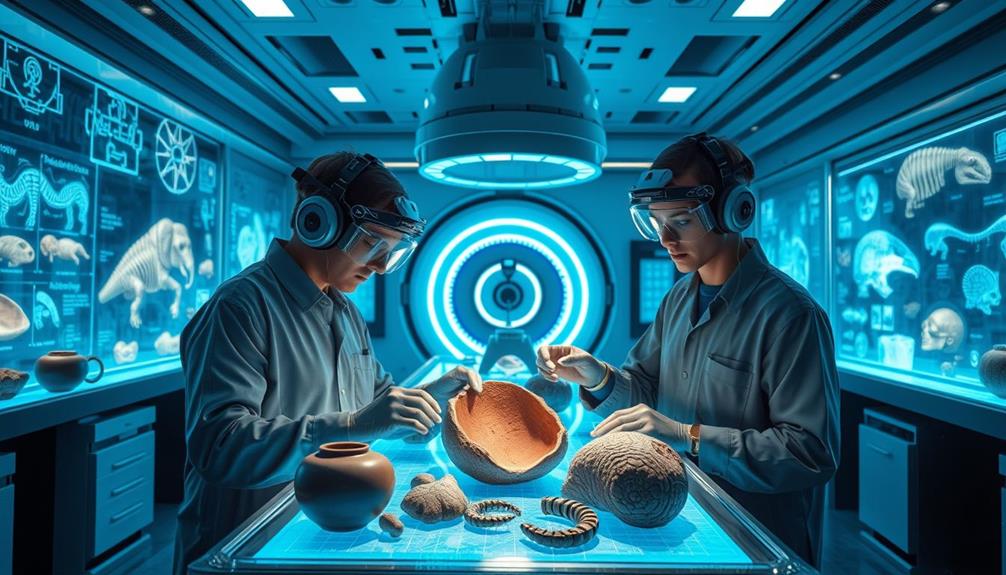
Building on the advancements in site discovery, advanced artifact analysis harnesses the power of AI to categorize and interpret archaeological finds with remarkable speed and accuracy.
By utilizing AI algorithms, researchers can rapidly classify artifacts based on materials, age, and significance through image recognition tools. This process not only accelerates classification but also enhances the depth of analysis.
Additionally, the integration of advanced security measures in digital archiving, such as those mentioned in CrowdStrike Outage and Microsoft Networks, guarantees that valuable archaeological data remains protected against potential cyber threats.
Key benefits of advanced artifact analysis include:
- Material analysis: Techniques like spectroscopy and X-ray fluorescence allow for detailed examination without physical handling.
- 3D modeling technologies: These tools reconstruct artifacts from images, providing insights into their structure and function.
- Contextual analysis: AI enhances the understanding of artifacts' cultural significance by examining their spatial and temporal relationships.
- Digital archiving: The integration of AI facilitates efficient storage and sharing of findings, promoting collaboration.
- Reduced human error: AI minimizes mistakes in data interpretation, guaranteeing more reliable archaeological research.
With these advancements, you're not just uncovering artifacts; you're also revealing the stories they tell, paving the way for innovative discoveries in the field.
Visualization and Reconstruction

In archaeology, visualization and reconstruction techniques are revolutionizing how you understand and interpret historical sites. These methods, like photogrammetry and LiDAR scanning, provide precise data analysis and offer detailed captures of archaeological landscapes. With 3D modeling, you can explore virtual representations of artifacts and structures, supporting preservation efforts through digital documentation.
| Visualization Technique | Purpose |
|---|---|
| High-Resolution Imaging | Detects subtle anomalies in satellite imagery |
| Digital Twin Technology | Creates real-time simulations for immersive experiences |
| Advanced Visualization Tools | Engages the public with interactive digital exhibits |
AI analysis plays a significant role in enhancing these techniques, revealing buried structures and previously unknown features. Furthermore, digital twin technology fosters interactive engagement, allowing both researchers and the public to experience ancient sites like never before. By leveraging virtual reconstructions, you can investigate the past with remarkable accuracy and accessibility. Ultimately, these advanced visualization tools not only enrich your understanding of archaeology but also spark greater interest in the field.
Ethical Challenges in AI
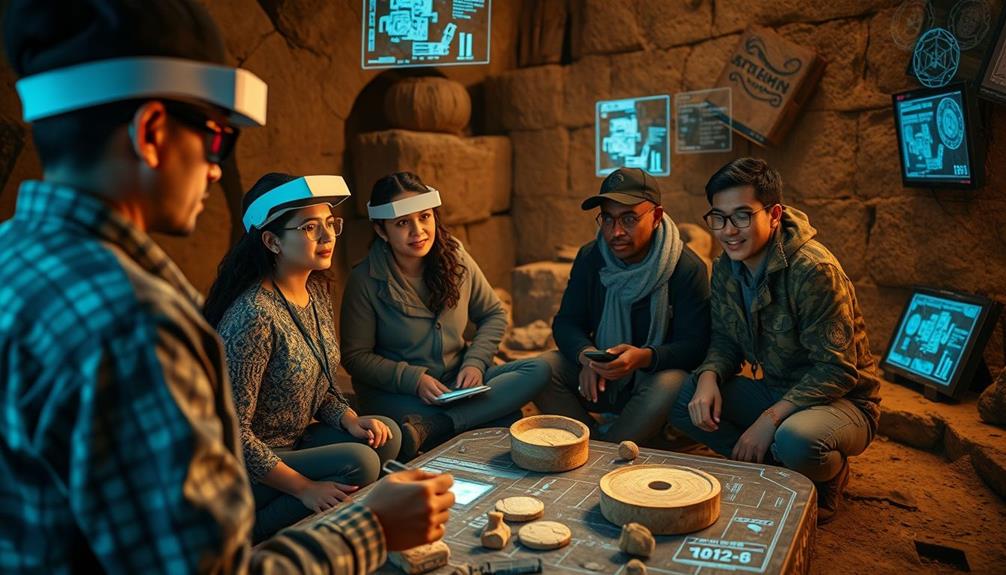
The integration of AI in archaeology brings significant ethical challenges that can't be overlooked. When employing AI technologies, you face the risk of misrepresenting cultural heritage, especially if algorithms inherit biases from their training data. This can lead to skewed interpretations of archaeological findings that don't respect the true context of artifacts.
Understanding narcissism helps highlight the importance of empathy and thoughtfulness in these technological applications.
To navigate these challenges, it's vital to reflect on:
- The ethical use of AI tools in analyzing sensitive information.
- The rights and interests of indigenous communities that may be impacted by AI-driven research.
- The importance of maintaining context when automating processes.
- The necessity of ethical frameworks to guide AI applications in archaeology.
- The complexities surrounding data ownership and privacy issues related to cultural heritage sites.
As you engage with AI, remember that it's not just about technology; it's about the people and cultures behind the artifacts.
Balancing innovation with respect for cultural heritage and the rights of indigenous communities will be essential in addressing these ethical dilemmas effectively.
Future Prospects for Archaeology
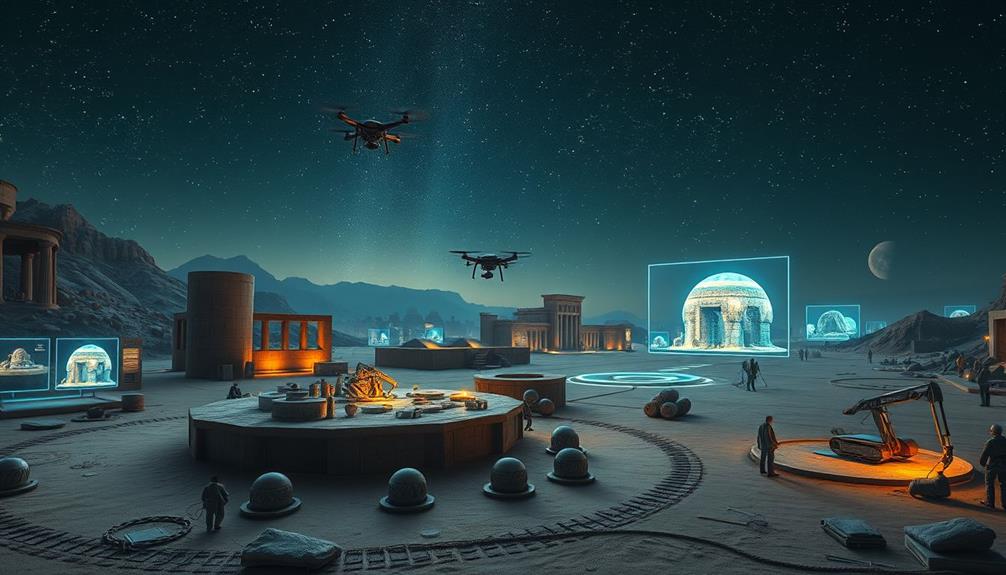
As you explore the future of archaeology, you'll notice that advancements in predictive analytics are set to transform how researchers identify excavation sites.
The integration of AI technologies enhances data analysis, allowing for more precise site selection and excavation planning.
This shift aligns with the need for ethical frameworks to guarantee that the insights gained from AI are used responsibly and inclusively.
This evolution promises to reshape our understanding of the past while fostering collaboration across the field.
Predictive Analytics Advancements
Harnessing predictive analytics is revolutionizing the field of archaeology, making it possible to reveal hidden historical treasures with unprecedented accuracy. By utilizing machine learning algorithms, you can analyze historical and environmental data to identify potential archaeological sites with over 80% accuracy, as shown in studies from Mesopotamia.
This innovative approach draws parallels to how astrological signs and perceived attractiveness can influence social behaviors, emphasizing the importance of data interpretation in both fields.
This advanced approach integrates various technologies, leading to significant improvements in site discovery and excavation planning:
- Combines satellite imagery and GIS data to create heat maps of high archaeological potential
- Minimizes the need for extensive ground surveys, reducing costs and time
- Enhances the efficiency of exploring vast and remote areas
- Promotes sustainability by enabling targeted excavations that preserve artifacts
- Provides deeper insights into ancient civilizations and their settlement patterns
Future advancements in predictive analytics promise even greater capabilities. With enhanced data processing, you'll be able to identify previously undiscovered sites and understand ancient human behaviors better.
As AI continues to evolve, it will further transform archaeology, allowing you to unveil the mysteries of our past while maintaining a focus on preserving the environment and cultural heritage.
Ethical Data Management
Ethical data management stands at the forefront of future archaeological practices, ensuring that cultural heritage is handled with care and respect. As you embrace integrating AI, it's essential to establish frameworks that prioritize the responsible use of cultural heritage data. This will help prevent misrepresentation and bias, especially regarding indigenous rights and community interests.
Additionally, effective communication strategies can enhance collaboration among stakeholders and facilitate the sharing of cultural narratives, which is critical for a thorough understanding of heritage thorough in-home health care.
Transparency in AI algorithms plays a significant role in this effort. By making the decision-making processes clear, you can mitigate the risks of perpetuating biases that may arise from historical data. This transparency fosters collaboration between archaeologists, data scientists, and ethical committees, leading to the development of best practices that protect the integrity of cultural heritage.
When you focus on effective ethical data management, you enhance public trust and encourage greater engagement in archaeological projects. By prioritizing community interests, you create a collaborative atmosphere that supports heritage preservation and research.
Ultimately, the future of archaeology hinges on your commitment to ethical practices, ensuring that the stories of our past are told accurately and respectfully. This approach not only safeguards cultural heritage but also enriches the field for future generations.
Enhancing Cultural Heritage Preservation

You can see how AI-driven digital preservation techniques are revolutionizing the way we protect cultural heritage.
By integrating knowledge from ancient practices, such as the origins of herbalism, these innovations not only safeguard artifacts but also foster a deeper appreciation for our shared history.
Let's explore how these advancements are shaping the future of preservation efforts.
Digital Preservation Techniques
Digital preservation techniques play an essential role in enhancing cultural heritage preservation, employing methods like high-resolution imaging and 3D modeling to document artifacts and archaeological sites accurately.
By utilizing these techniques, you can guarantee that valuable cultural resources are preserved for future generations while minimizing physical handling. Furthermore, the integration of sustainable practices, like those used in Turtle Tree Seeds, can inspire ethical approaches to preserving both cultural and natural heritage.
Here are some key advantages of digital preservation techniques:
- High-resolution imaging captures intricate details of artifacts, facilitating detailed study.
- 3D modeling allows for the virtual reconstruction of sites, creating an interactive platform for education.
- Photogrammetry generates precise digital records, enhancing accessibility for researchers and the public.
- AI-driven digital archiving systems store vast amounts of archaeological data, making information easily retrievable and shareable.
- LiDAR scanning uncovers hidden features, enabling non-invasive exploration and documentation of significant landscapes.
With these advanced techniques, you can engage in effective cultural heritage preservation, fostering awareness and appreciation of historical sites.
Furthermore, virtual reality reconstructions provide immersive experiences that educate the public on the importance of preserving our shared past.
Ethical Data Management
Responsible handling of cultural heritage data is increasingly important as digital preservation techniques advance. You need to focus on ethical data management, ensuring sensitive information is treated with respect and care, particularly for indigenous and local communities.
As you integrate AI applications into archaeological research, developing ethical frameworks becomes vital for guiding data collection, analysis, and sharing practices.
Maintaining high-quality data integrity is essential, as biases in datasets can distort the representation of cultural heritage, leading to misunderstandings and misinterpretations. To combat this, you should engage in collaborative efforts with archaeologists, data scientists, and ethicists. Together, you can establish protocols that prioritize the preservation of cultural heritage while also leveraging the advancements AI offers.
Additionally, consider implementing continuous training and awareness programs focusing on ethical considerations in AI usage. These initiatives will help you navigate the complexities of data management and cultural sensitivity in your research.
Community Engagement Initiatives
Engaging local communities in archaeological initiatives not only fosters a sense of ownership but also enhances the preservation of cultural heritage. When you involve local populations in archaeological projects, you create opportunities for public participation that strengthen their connection to history.
Programs like "Archaeology in the Community" provide educational opportunities, allowing students to gain hands-on experience and learn about their cultural heritage.
Consider the following benefits of community engagement in archaeology:
- Empowerment: Involving community members fosters responsibility for preserving their cultural heritage.
- Knowledge Sharing: Collaborative projects promote the exchange of traditional knowledge between archaeologists and indigenous communities.
- Awareness: Using digital platforms and social media raises awareness about archaeological sites and their significance.
- Involvement: Annual events like Archaeology Days invite public participation, enhancing interest in heritage conservation.
- Tourism Boost: Engaging the community can promote heritage tourism, benefiting local economies.
These initiatives not only help protect cultural heritage but also encourage a collective investment in preserving history.
Case Studies of AI Applications
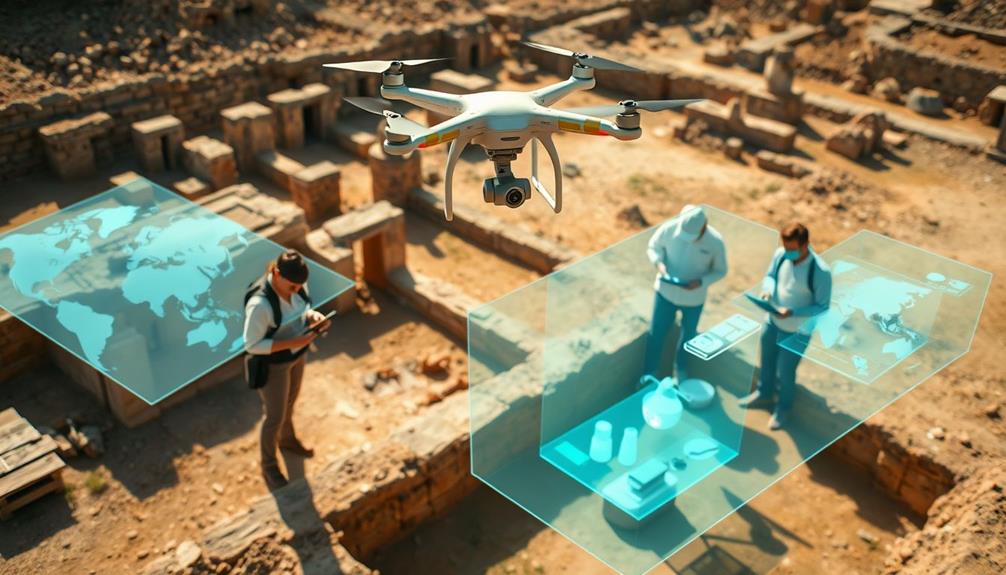
The transformative potential of AI in archaeology is evident through a variety of compelling case studies. One notable example is a Stanford University project that analyzed pottery distribution and ancient shipping records, revealing intricate trade networks across the Roman Empire. This research underscores how AI can enhance our understanding of historical commerce.
In Mesopotamia, thousands of cuneiform tablets were examined using AI, uncovering sophisticated financial instruments like promissory notes and complex loan agreements. These discoveries provide invaluable insights into the economic systems of the time.
Another exciting case is the Vesuvius Challenge, launched in March 2023, where AI was employed to decipher scrolls buried by Mount Vesuvius. The winning team successfully interpreted over 2,000 characters from a previously unreadable Epicurean philosophical manuscript, showcasing AI's potential in unraveling lost texts.
Moreover, AI-driven algorithms demonstrated an 80% accuracy rate in identifying new archaeological areas by analyzing satellite imagery and historical data.
Remote sensing analysis further enhanced this process through automatic pattern recognition of archaeological sites, markedly boosting the classification and discovery of hidden artifacts.
These case studies highlight AI's transformative role in the field of archaeology.
Frequently Asked Questions
What Are the Golden Years of AI Research in the History of Ai?
The golden years of AI research span the mid-1950s to mid-1970s and again from the late 1980s to early 2000s. You'll see significant advancements during these periods, shaping the foundation for modern AI technology.
What Are the Advanced Archeology Technologies?
You'll find advanced archaeology technologies like GIS for mapping, LIDAR for detecting hidden structures, photogrammetry for 3D modeling, and machine learning algorithms to analyze data, all enhancing excavation planning and preserving cultural heritage effectively.
How Have Recent Developments in Technology Helped the Expansion of Archaeological Research?
Recent tech breakthroughs have propelled archaeological research into an area of unimaginable possibilities. You're now equipped to uncover hidden sites, analyze ancient texts, and explore remote areas, transforming your understanding of history like never before.
What Is the New Technology Used by Archaeologists?
Archaeologists now use drones, high-resolution satellite imagery, and Geographic Information Systems to map sites. They also employ remote sensing technologies and AI algorithms for rapid data analysis, enhancing excavation planning and improving archaeological research outcomes.
Conclusion
As you explore the intersection of AI and archaeology, think of technology as a modern-day Rosetta Stone, revealing the secrets of our past. With predictive modeling and advanced analysis, you're not just uncovering artifacts; you're illuminating the narratives that shaped civilizations. Yet, as you tread this delicate ground, remember the ethical compass guiding your journey. Embracing AI's potential means preserving the rich tapestry of cultural heritage for future generations to appreciate and learn from.










